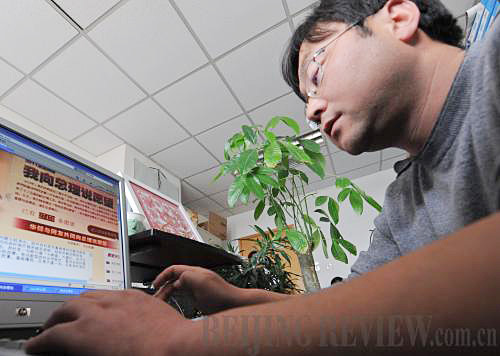|
 |
|
SUBMITTING PROPOSALS: A man in Beijing puts forward his opinions on some social issues on the Internet (ZHANG YU) |
Without Stability, Nothing Is Possible
With the opening of the annual sessions of China's National People's Congress (NPC) and Chinese People's Political Consultative Conference (CPPCC), NPC deputies and CPPCC members from around the country are gathering in Beijing, contributing their ideas on national development during the 12th Five-Year Plan (2011-15).
During the 11th Five-Year Plan (2005-10), China has seen tremendous enhancement of its overall national strength, remarkable improvement in people's living conditions, and a marked rise in international status and influence. Like the overall national situation, the capital city of Beijing is also changing and developing fast with each passing day, and local citizens are living stable and happy lives. But recently, some hostile forces from both in and outside China are attempting to bring chaos into the city. They instigated illegal assembly through the Internet, and tried to make trouble and stir up "street politics." The broad public is strongly opposed to these farces.
Since the founding of the People's Republic of China in 1949, particularly during the past 30 years since China adopted its reform and opening-up policy in the late 1970s, a weak and backward China has been transformed into a prosperous new country. At no time have the Chinese people ever been so hopeful about the future.
This year marks the opening of the 12th Five-Year Plan, which presents important strategic opportunities and will lay a critical foundation for the development of a modern and well-off society in an all-round way. At this juncture, stability is a blessing while turbulence is disaster. Without stability, nothing is possible. To maintain stability is the common will and aspiration of all Chinese people.
Only in a stable society is it possible for individuals to fulfill their dreams and for people's living conditions to be further improved. Experience throughout history tells us that turbulence harms the society and that harmony and stability are good for everyone. To maintain harmony and stability should therefore be the common task for all.
Residents in Beijing must lead the rest of the country in maintaining harmony and stability as well as the present good social environment. As long as they dedicate themselves to their own work, turn deaf ears to rumors and give no chance to hostile forces for trouble making, everyone will be able to contribute to the maintenance of social harmony and stability.
Beijing Daily
Hard Indexes
Rocketing prices of various commodities, especially housing properties, put greater expectations about people's livelihoods on the agenda of this year's National People's Congress (NPC) and Chinese People's Political Consultative Conference (CPPCC) plenary meetings than ever. To our pleasure, signals from the two meetings show with greater clarity things such as residents' incomes, consumption capacities and service-oriented employment will be listed among "hard indexes" for officials' performance appraisal. The new round of livelihood development is speeding up.
These are old topics brought up again and again in many years of NPC and CPPCC meetings. Despite promises from governments at various levels, there are no tangible results. The deepest reason is the lack of hard indexes on livelihood programs. If certain indexes affect officials' performance appraisals and personal promotions, then related programs will be highly stressed.
Some local governments attach great importance to indexes and are willing to undertake projects that are not readily measurable by hard indexes, such as GDP or industrial growth. Based on such phenomenon, making more hard indexes in the appraisal system for officials' performance is an effective way to improve people's livelihood.
During the 11th Five-Year Plan of China, there were only eight restrictive hard indexes among 22 major ones, while during the draft for the 12th Five-Year Plan, there are 12. Increasing problems in people's lives demand the government care more about people's actual quality of life. We hope to see more hard indexes on livelihood-related programs.
Qilu Evening News
E-Proposals
Before this year's plenary meeting of the Chinese People's Political Consultative Conference (CPPCC), 30 e-proposals from netizens were selected from the Internet and offered to CPPCC members as a reference.
Netizens' proposals cover problems related to rural areas and farmers, housing price control and education reform. These reflect their main concerns about life and also expectations for the 12th Five-Year Plan.
The plenary meetings of the National People's Congress (NPC) and CPPCC mainly discuss issues concerned by the deputies and members attending the meetings, but more importantly, they are a good opportunity for ordinary people to contribute their ideas and voice their demands. The public's active action in submitting e-proposals shows rising awareness and participation by the people.
Besides, since e-proposals are submitted online, rather than on paper, they are environmentally friendly.
This is only a start, and only 30 proposals were selected, but in the future we expect more e-proposals will be used in NPC and CPPCC meetings. China has 1.3 billion people, but NPC deputies and CPPCC members are only a small proportion and their vision is thus limited. Therefore, as greater numbers of ordinary people submit their proposals on the Internet, their voices can be better heard and their needs can be better met.
Workers' Daily
| 